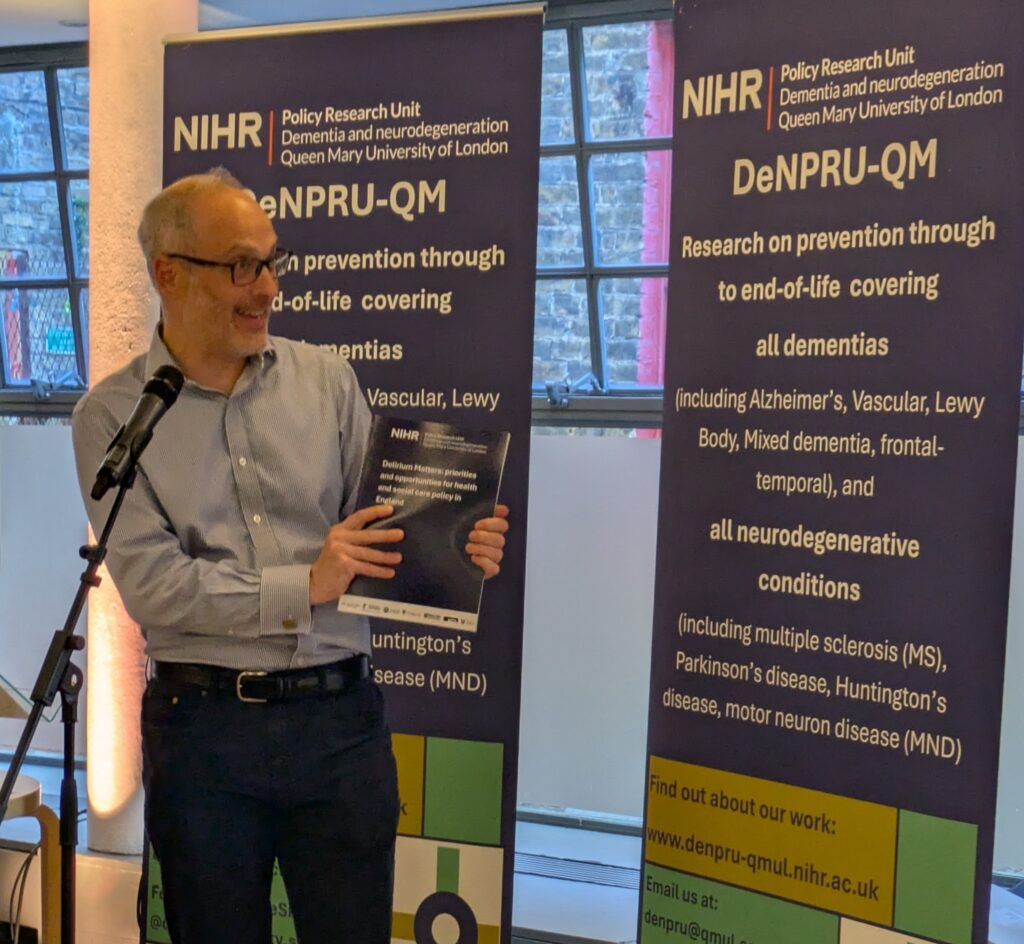Delirium Matters: a new report from DeNPRU-QM
On a warm spring evening in the heart of Whitechapel, London, close to 60 people gathered for the launch of DeNPRU-QM’s new report ‘Delirium Matters: priorities and opportunities for health and social care policy in England.
Led by Professor Liz Sampson, the report reviews English health and social care policy and strategy from 2010 and makes a compelling case for why the health and social care system should prioritise delirium.

Delirium and its impact
Delirium is a “common, complex medical condition which we frequently miss and do not manage well” says Professor Sampson. “It has a high mortality rate and profound impact on patients and our health and social care system”. One of the challenges of delirium is that it develops suddenly, causing symptoms such as confusion, agitation, withdrawal or hallucinations. While anyone can experience delirium, it is especially common in older adults, particularly those with dementia or other neurodegenerative conditions such as Parkinson’s.
Delirium costs the NHS approximately £10.8 billion annually but despite its impact, it remains under-recognised. Inconsistent terminology and the way in which screening tools are used can lead to missed cases and inadequate care. Delirium can have far-reaching consequence, which include:
- Extended hospital stays and delayed patient discharge
- Increased risks of falls, cognitive decline, and mortality
- Greater need for long-term care placements, putting further strain on health and social care systems
Although delirium is a serious condition, it can be avoided with the right awareness and action. Up to a third of delirium cases are preventable, which could save the NHS between £1.8–2.8 billion each year.
‘Shining a light’ on delirium
People affected by delirium have been involved throughout the research, sharing their experiences in online focus groups and shaping the policy recommendations. Nicola Handley, a member of DeNPRU-QM’s Patient and Public Engagement Group (PPEG) spoke movingly about her mother’s experience of delirium and her perspective as a family carer. “My mum has had delirium many times, but no one ever called it that” she said. Taking part in this research has encouraged Nicola to advocate for those affected by delirium and ensure that medical staff use the correct terminology to describe what patients are experiencing. She hopes that the report will “shine a light on delirium” so that more families feel that they can advocate for the care they need.
Dr Jeremy Isaacs, National Clinical Director for Dementia and Older People’s Mental Health at NHS England, praised Professor Sampson’s leadership in the field of delirium over many years. He emphasised his support for the report’s recommendations and his ongoing commitment to getting delirium “properly prevented, properly diagnosed and properly treated”.
What are the recommendations?
The Delirium Matters report outlines five urgent policy recommendations to improve care and outcomes:
- Better Data Collection: Gather comprehensive national data on delirium across health and social care settings to understand and manage it effectively.
- Consistent Terminology: Always use the term “delirium” in policies and clinical settings to ensure clarity and seriousness
- Avoid Preventable Harm: Implement existing safety policies and interventions to reduce avoidable harm caused by delirium.
- Focus on Surgical Care: Target settings where delirium is common, such as post-surgery, with improved screening and care measures.
- Strengthen Community Care: Ensure home-care programs can identify and manage delirium, reducing unnecessary hospital admissions.
Delirium is a preventable and manageable condition, but it requires awareness and action. By recognising its seriousness, implementing targeted policies, and shifting focus toward prevention and community care, the NHS can significantly reduce its impact. To find out more, please read the full report or shorter policy briefing by clicking on the links below.
Full report: Delirium Matters: priorities and opportunities for health and social care policy in England

Professor Liz Sampson
We hope this report provides policy makers with practical solutions to improve delirium detection and care.



